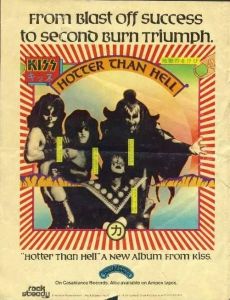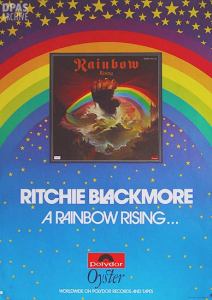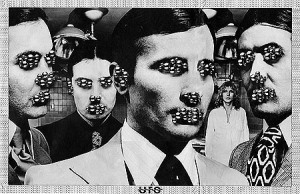Blue Oyster Cult’s first three albums: A masterclass in 70’s hard rock songwriting and tasteful playing, equal parts nuance and bombast, delivered with both menace with considerable wit. But let’s face it: they sound like shit. Words like ‘thin’, ‘flat’, and ‘tepid’ are often used to describe the sound quality of these records. Imagine the impact this trio of albums would have had if they shared the production value of other contemporary US hard rock bands; say, Aerosmith or Montrose. Methinks BOC would have had a much better chance of achieving their initial goal of becoming ‘The American Black Sabbath’ had these records sounded like what they looked like.
The sub-par sound doesn’t hamper my enjoyment of these records at all; in fact, ‘Secret Treaties’ is one of my top three favorite albums of all time. Production value is only one element of a record’s overall success; if the songwriting’s great, and the playing’s stellar, it’s easy to overlook a record’s sonic shortcomings. Most of us grew up listening to badly-produced records before we really knew or cared about the sound quality of the music we listened to. Some of us still don’t care. I do; when I hear a record like ‘Tyranny and Mutation’, and those crazy, crafty and cryptic tunes, I hear a missed opportunity; I want it to knock me flat on my ass, but it just doesn’t have the visceral impact that it could.
Of course this is all just my opinion. In my own musical universe, there are a handful of albums that frustrate me endlessly because, to my mind, the sonics just don’t live up to the caliber of the material or the level of the performances. But I get it: inadequate budgets, inexperienced producers, bad decisions and drugs happen. Truth be told, I wouldn’t change a single second of any of these records… I love them all dearly… But it’s hard not to lament what might have been. Here are my three favorite examples:
Kiss/Hotter Than Hell
So many things went wrong for Kiss in 1974, it’s a wonder they made it to ’75. Sales of the debut failed to live up to expectations, so a mere six months after the release of their debut, their label, Casablanca, pulled them off the road and shoved them back into the studio for a quick follow-up. The production duo of Kenny Kerner and Richie Wise were again tapped to produce, but had both moved to California, so the four New Yorkers flew to sunny Los Angeles to record their all-important 2nd record. The project was regarded by Casablanca as ‘make or break’; not only for Kiss, but for the label as well. The fledgling label had just lost it’s distribution deal with Warner Brothers Records, and Warner’s promotional budget with it. A lot was riding on this record…
Several books have been written on the early days of Kiss, including biographies by all four members. Each tells the same story about how difficult the sessions for ‘Hotter than Hell’ were: the band hated LA, Kerner and Wise hated the studio, Ace wrecked his rental car and was injured, Paul Stanley’s custom-made Flying V was stolen on the day the sessions began. Wah. None of this had anything to do with why this record sounds like a garbage can filled with forks rolling down a stairwell. The real culprits were Kerner and Wise.
While the pair had done a decent job on Kiss’ debut, Wise wanted to move the band’s sound in a different direction. Hoping to better align their music with their image, Wise planned to move the band away from their rock n roll core and toward a heavier, more menacing sound. This was Stupid Idea #1. Stupid Idea #2 was to record everything ‘hot’, meaning distorted, needle-in-the-red ‘hot’. As in ‘Hotter Than Hell’. Get it? Wise stated in the book “Kiss: Behind the Mask” that ‘It’s the worst-sounding album I ever recorded. It was overly compressed and overdriven. I’ll take the blame for wanting to make it heavy and distorted… The intent was to make a Black Sabbath kind of sounding record, but it just didn’t pan out sonically.’ He also called it ‘…very harsh and just disgusting.’ Paul Stanley’s bio also acknowledges that the distortion in the recording was intended.
Several songs on ‘Hotter than Hell’ have risen from the murk and gone on to become bona fide Kiss Klassics; a testament to the strength of the material. Unfortunately this clusterfuck recording renders them almost unlistenable. Even with huge advances in recording technology, this recording simply cannot be fixed. When Kiss put out their ‘Double Platinum’ best-of in 1978, most of the songs included were remixed, but the two from HtH were not… because it wouldn’t have helped. The distorted signal that Wise was after is printed on the original tapes, and it’s there to stay. The Kiss catalog was remastered in 1997, allowing Kiss fans to hear this godawful sludgy mess with crystal clarity.
The Kiss story almost ended right there in the control room of Village Recorders in West Los Angeles, California. ‘Hotter Than Hell’ flopped hard, peaking on the charts even lower than the debut. After the failure of HtH, Kiss faced losing their recording contract, and Casablanca faced bankruptcy. Four months later, Kiss was once again forced off the road and into the studio. Dressed to Kill was Kiss’ third album in 13 months, was NOT produced by Kerner and Wise, and peaked at #32. The rest is history.
Rainbow/Rising
What could one say about Rainbow’s 1976 classic, ‘Rising’, that hasn’t already been said? How about this: ‘It sounds like shit.’ Some of Metal’s greatest performers deliver some of their strongest performances here, and there’s a handful of indisputably classic songs on hand (side two is flawless). However, all of the epic grandeur of Blackmore/Dio’s finest hour (34 minutes, actually) is buried in a resoundingly flat, one-dimensional mix, devoid of any discernable bottom end, and utterly lacking the clarity and depth that this material calls for. The strength of the songs and the musicianship shines through, making this record an absolute classic of the genre… But sonically, it sucks.
‘Rising’ was recorded at Musicland Studios in Munich, Germany; same studio that hosted the ‘Ritchie Blackmore’s Rainbow’ sessions a year earlier. Martin Birch helmed both records. So how come the sonics on ‘Rising’ are so… crappy? Well… Birch’s initial mix (completed in LA) was rejected by the band’s label as being ‘too bass-heavy’, and the album was remixed (in NY). It’s the NY remix of the record that was pressed onto plastic. What went wrong here? Cozy Powell sounds like he’s playing in a separate room; bassist Jimmy Bain in another zip code. Dio’s vocals sound phoned-in… literally. In the louder, busier passages (and what’s HM if not loud n’ busy), the sound dissolves into an annoying grey mess.
Things were rectified somewhat in 1986, with ‘Rising’s first appearance on CD. Birch’s original LA mix was utilized when the record was mastered, as Polydor were unable to locate the master tapes of the NY mix. This version of the album sounds pretty great, with Bain’s bass loud and clear, Dios vox are warmer and several layers of guitar and keyboard overdubs apparent that were barely audible on the NY mix. This version was available commercially for a little over a decade, until Polydor remastered the entire Rainbow catalog in 1999.
‘Rising’s ’99 remaster utilized Birch’s NY remix… But how, if the original tapes weren’t available? The mastering engineers at Polydor utilized the ‘needle-drop’ method; they used a vinyl copy of the album, plus tons of noise reduction and digital tweaking. This was done mainly so the label could market the remaster as the ‘original mix’. But the original ‘original’ mix was in fact the LA mix… Are ya confused yet? The ’99 remaster does sound decent, considering it’s source material. Thankfully, this epic saga has a happy ending.
In 2011, 35 years after the album’s original release, a Deluxe Edition of Rainbow’s ‘Rising’ was issued in a two-CD set. Both the NY and LA versions are featured, both newly mastered, providing nerds like me a great way to compare both mixes. The remaster of Birch’s original LA mix wins hands-down. On disc 2, a rough mix of the entire album is included, and even it sounds better than the NY remix ordered by the label. Moral of the story? Don’t mess with a Martin Birch Mix. Perhaps the Mystery of the New York Mix will be explained in Birch’s book…
UFO/Obsession
Okay, this one’s probably just personal preference.
UFO’s fifth Schenker-riffic album, Obsession, contains some of the greatest lead guitar playing of the 1970’s. To capture it, producer Ron Nevison located a disused post office building just outside of Los Angeles, set up Schenker’s favorite 50-watt Marshall head on top of 2 a Marshall 4×12 cabinet and let the German genius wail away at will into the cavernous space. The sublime tone and fiery attack of Schenker’s lead work never sounded better.
Nevison’s approach to recording the rhythm guitar tracks was a bit different. The famed British producer had previously produced and/or engineered records by The Who, Led Zeppelin, Bad Company, and The Rolling Stones, so nobody argued when the legendary producer set up microphones around a Pignose amplifier.
The ‘Pignose’ amplifier is a small, portable, battery-operated 5-watt amp that employs a single 5-inch speaker. It was created as a practice amp that could be used in a variety of places and situations without having to plug in to a power outlet. The Pignose ‘sound’ at it’s best is a mid-to-high end processed fuzz/crunch; nasal and treble-y, but certainly decent enough for warming up backstage or practicing quietly at home without disturbing Mom and Dad. But when it comes to 70s Hard Rock, isn’t disturbing Mom and Dad mandatory?
To these ears, the rhythm guitars on ‘Obsession’ sound barely demo-worthy. The riffs written into the harder songs sound limp, fuzzy… almost comical. The Pignose was used by Nevison on UFO’s previous album ‘Lights Out’, but merely as one more guitar sound for that record’s expansive sonic palate. On ‘Obsession’, the Pignose’s signature ‘sound’ is harnessed and expressly highlighted, removing the crunch and punch from some potentially monstrous riffs and creating several infuriating moments of near-parody, subverting the very idea of riff rock itself. Perhaps Nevison was aiming to play with the contrast between the two sounds; it doesn’t work.
Where the Pignose works well is in the record’s quieter moments; the li’l champ adds some textured delicacy to the chorus of ‘Born to Lose’ and to the intro to ‘I Ain’t No Baby, as well as some brassy, trumpet-like sass to ‘Lookin’ Out for No. 1 (Reprise)’. But Oh, how I would LOVE to hear the balls-out rockers like ‘Hot n’ Ready’, ‘Pack It Up (and Go)’, or ‘One more for the Rodeo’ played through Schenker’s own equipment, or maybe (since we’re daydreaming here) through brother Rudy’s Scorps gear. Imagine if the Mad Axeman had rejected that rizzy little box with the Radio Shack speaker, and instead tore into ‘Only You Can Rock Me’ with the ‘post office’ set-up… Talk about ‘going postal’!



Agree so much about BOC’s first three more than the others. I mean, it’s been said a lot, but damn!
I think there’s a mystique to the sound of that production. Like, ok. It sounds like ’60s garage/psych-style production on a heavier band, which is kinda cool and adds an ethereal vibe a lot of times that isn’t available with a bunch of better-produced bands of the time. But at the same time, if I could hear studio versions of those songs from that period that DIDN’T sound thin and trebly, that’d be so much better. As it stands, OYFOOYK best communicates the energy and impact of these songs, but even amateur live boots and live radio boots from their early years tend to top the studio albums. I honestly had no clue how evil sounding those riffs in the middle of “Screams” were until I heard live recordings of it. And “Astronomy” and “Harvester of Eyes” are entirely different beasts, too, when heard anywhere in ’70s recordings but Secret Treaties. And then when they finally had the success to afford them time to take control of the studio, they start toning down their sound. And I have no real gripes with their more varied later fare, but if they could have put out another heavier record with the production value of Agents, that would have been amazing.
Imho, Cultosaurus Erectus is your ‘heavier record with the production value of Agents’.
Ron Nevison is American!
I stand corrected!
I always wondered why Hotter than Hell could not be remastered to correct the problems. I had always assumed it was due to a bad mastering. But, Richie was an amateur engineer and apparently did not understand headroom at all. Too bad, because the songs are interesting. Particularly Ace Frehley’s compositions.